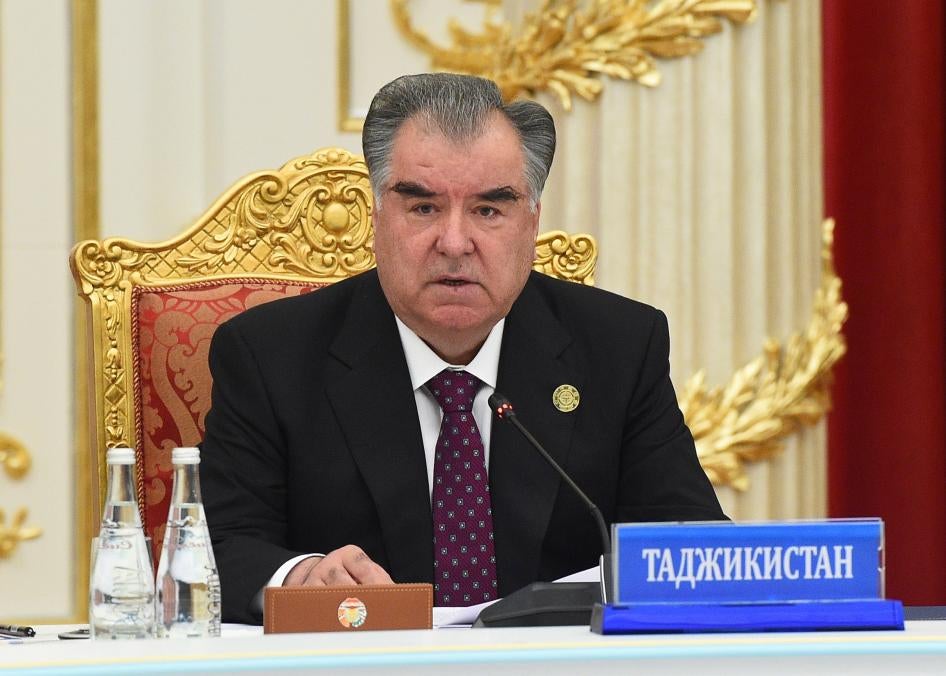(Berlin, June 22, 2022) – A court in Dushanbe, the capital of Tajikistan, has ordered two independent bloggers to be detained for two months as they await trial on charges of cooperating with banned organizations and political parties, and the alleged beating of a police officer. The two bloggers, Daleri Imomali and Abdullo Ghurbati, are known for their critical coverage of state institutions and investigative journalism pieces posted on Imomali’s YouTube channel.
“Imomali and Ghurbati are being targeted for their professional activities, despite being protected by Tajikistan’s laws and international obligations on freedom of expression and media freedom,” said Syinat Sultanalieva, Central Asia researcher at Human Rights Watch. “Criticizing state institutions is not a crime, and the bloggers should be released immediately and all charges against them dropped.”
Officials from Dushanbe prosecutor’s office detained both Imomali and Ghurbati on June 15, 2022, initially on charges of illegal entrepreneurship. Imomali was also charged with premediated false denunciation and Ghurbati with allegedly attacking a police officer, an accusation he denies.
During the court hearing on June 18, the court added a charge of “participation in activities of banned political parties and organizations” under article 307(2) of Tajikistan’s criminal code. Official representatives of the two largest banned parties in Tajikistan – the Islamic Renaissance Party of Tajikistan (IRPT) and Group 24 – later refuted this accusation, saying the men had no association with their parties.
The criminal investigation is now underway, with Imomali’s case categorized as “secret.” If found guilty, the bloggers could face between two and seven years in prison.
The city police in both Dushanbe and Vakhdat, where he had traveled to film a documentary, had previously interrogated Imomali about his professional activities as an independent blogger. On June 4, when the Dushanbe police questioned Imomali, they beat him, but later released him on the condition that he would delete some content from his YouTube channel.
The prosecution of Imomali and Ghurbati comes on the heels of other cases of harassment, intimidation, and unlawful imprisonment of journalists in Tajikistan. Over the past month, two other journalists, Khushom Gulom and Ulfatkhonim Mamadshoeva, were detained without due process. Both are from the Gorno-Badakhshan Autonomous Oblast (GBAO), where tensions between locals and Tajik security forces escalated during a series of protests in May.
A former security services colonel, Mamadsulton Mavlonazarov, was detained as well, seemingly in connection to his critical comments about the current head of the State Committee on National Security and the state’s response to May protests in the region. His whereabouts were revealed only three days after his detention.
Four journalists from the media outlets Radio Ozodi and Current Time were attacked after they interviewed Mamadshoeva, whom the police had accused of co-organizing the May protests in the region. Unidentified attackers stole the journalists’ equipment and mobile phones, severely beating and threatening to kill one of them, Mullorajab Yusufzoda. On the same day, Asia Plus, an independent media outlet in Tajikistan, announced that it would no longer cover the events in Khorog, the capital of the autonomous region, following a formal warning by the Prosecutor General’s Office that the outlet could be closed down for its alleged “one-sided” coverage of the protests.
Journalists and civil rights activists had previously demanded an investigation into recent attacks on journalists, and called for the release of Imomali and Ghurbati. Reporters Without Borders condemned their detention, calling for their immediate release, while the delegation of the European Union in Tajikistan expressed concern and said it is following the case closely.
Tajikistan has a long history of prosecuting journalists and bloggers for their critical opinions. Tajikistan’s telecommunications agency regularly blocks websites that carry information potentially critical of the government, including the Radio Ozodi website. The authorities also regularly refuse accreditation to journalists for the country’s only independent media at Radio Free Europe’s Tajik service, while harassing journalists of other media for covering critical issues and events.
Tajik authorities should respect freedom of expression and stop preventing journalists from carrying out their professional activities. The country’s regional and international partners should also hold Tajikistan accountable to its human rights obligations.
“Critical voices and opinions are important for a democratic society and stifling them is a violation of international human rights norms on freedom of expression,” Sultanalieva said. “Journalists and bloggers currently in detention for their work should be released, and their cases independently reviewed.”









